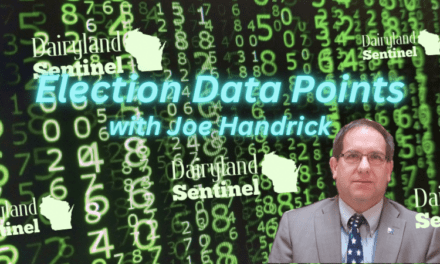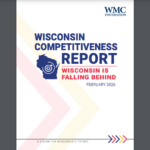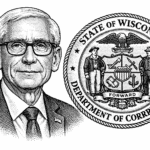Congratulations on surviving the solar eclipse.
It was touch and go there for a while.
Let’s get right to your Key Reads
Wisconsin’s longest serving State Senator has announced his retirement, at the end of his current term in January.
Wisconsin Senate’s longest-serving member will not seek reelection | AP
Sen. Rob Cowles, the longest-serving incumbent in the Wisconsin Legislature, announced Monday he will retire rather than run in a district now more favorable to Democrats or move under new district boundaries that take effect in November.
Cowles, 73, had originally said he planned to move and run again to represent the bulk of the district he currently serves that is more Republican. He was first elected to the Assembly in 1982 and resigned in 1987 after he won a special election to the Senate…
Cowles said “after much thought and deliberation,” he has decided against seeking reelection.
“I’ve enjoyed the opportunity I’ve had to meet people in the State Capitol and throughout Wisconsin who share my love for the state we call home,” Cowles said in his statement. “From the bottom of my heart, I want to thank everyone who wakes up every day working to make our great state an even better place.”
Health care access and support for nurses matter. Except for when Big Government matters more, apparently.
Evers vetoes Advanced Practice Nurse law for Wisconsin | The Center Square
Wisconsin will not be joining the list of states that allow advanced practice registered nurses to work on their own.
Gov. Tony Evers vetoed a state law to expand the care that APRNs could provide…
The plan Evers vetoed would have allowed APRNs in Wisconsin to work independently without the need for a collaborative agreement with a supervising doctor.
Sen. Patrick Testin, R-Stevens Point, said it is “utterly ridiculous and downright irresponsible” that Evers vetoed the plan once again.
“Gov. Evers may have declared 2024 to be the ‘Year of the Worker,’ but it’s a shame he doesn’t believe that APRNs are qualified enough to do the jobs they were trained to do. As a result, we will all pay the price – primarily through higher medical bills and less-accessible healthcare,” Testin said.
Republicans first introduced the APRN legislation in 2021.
Twenty-seven other states, including Wisconsin’s neighbors Minnesota and Iowa, allow for APRNs to work independently.
Mental health matters, or so we are told. Except when Big Government matters more, apparently.
Evers vetoes bill to allow mental health services from out-of-state providers | WPR
Supporters of legislation to allow out-of-state mental health care providers to treat Wisconsin residents say they aren’t giving up on the effort despite a veto late last month by Gov. Tony Evers. But some mental health advocates say the state should be more focused on increasing community-based services.
The bill, which received bipartisan support, was one of many Evers vetoed recently after the Legislature wrapped up its regular session. It would have allowed a mental health care provider who lives and is credentialed in another state to provide telehealth services to patients in Wisconsin.
During the COVID-19 pandemic, Evers issued an executive order allowing out-of-state providers to see Wisconsinites using telehealth services. But in his veto message, the governor said allowing a permanent exemption to state licensing laws could leave residents with fewer protections if they receive poor quality or unethical treatment from a psychologist, therapist or other provider…
The Institute for Reforming Government, a conservative advocacy group, was a primary supporter of the legislation. Chris Reader, executive vice president of the group, said the governor’s veto was disappointing after the bill received bipartisan support in the Legislature.
“There’s a real mental health crisis in Wisconsin. There’s not enough providers,” Reader said. “This is certainly not a silver bullet piece of legislation, but it was a way to just try and let people get help if they couldn’t otherwise find a provider in their home community.”
First they tell us not to stare at the sun. Now the government feels they need to warn us not to get friendly with wild bears.
As spring rolls in, DNR reminds you to be bear-y aware of your surroundings | WEAU
As the weather warms and Wisconsinites begin spending more time outside, the Wisconsin DNR encourages people to be bear-aware and take steps to prevent potential conflicts with black bears this spring.
Every spring, black bears emerge from their dens in search of food and potentially new territory. These explorations sometimes cause unexpected interactions between black bears and the public. Black bears are much more common in the northern half of the state, but southern Wisconsin has seen increased black bear activity in recent years.
Bears are normally solitary forest animals, but their powerful sense of smell can lead them into urban areas in search of food, especially in the spring and fall.
To avoid potential conflicts, it’s important to recognize what attracts black bears and take steps to reduce these attractants whenever possible. Black bears are known for returning to locations where they’ve found good food sources, so prevention is the best tactic…
If a bear is near your home or cabin, get to a safe location and try to scare the bear away by making loud noises (like clanging pots and pans together) or throwing objects in the bear’s direction. Black bears tend to avoid interactions with people if escape is possible, so make sure it has a clear escape route – never corner a bear. Do not turn your back to a bear or run away.
If you encounter a bear while in the woods, stay calm and do not run. Wave your arms and make loud noises to scare it away. Back away slowly and seek a safe location from where you can wait for the bear to leave and never approach one. Also, do not attempt to break up a fight between a pet and a bear.
All Wisconsinites know that the worst thing about encountering a Bear in the woods usually is that they can’t stop talking about 1985.
Still, you’d rather avoid them, so remember those tips.
That’s it for today. We’ll be back with more Key Reads tomorrow.
















